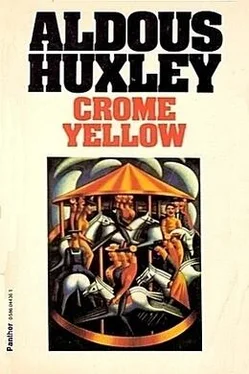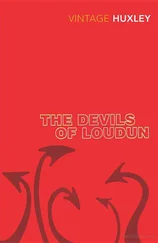"I'm sorry," said Mr. Scogan. "I for one, without ever having had the slightest appreciation of painting, have always taken particular pleasure in Cubismus. I like to see pictures from which nature has been completely banished, pictures which are exclusively the product of the human mind. They give me the same pleasure as I derive from a good piece of reasoning or a mathematical problem or an achievement of engineering. Nature, or anything that reminds me of nature, disturbs me; it is too large, too complicated, above all too utterly pointless and incomprehensible. I am at home with the works of man; if I choose to set my mind to it, I can understand anything that any man has made or thought. That is why I always travel by Tube, never by bus if I can possibly help it. For, travelling by bus, one can't avoid seeing, even in London, a few stray works of God—the sky, for example, an occasional tree, the flowers in the window–boxes. But travel by Tube and you see nothing but the works of man—iron riveted into geometrical forms, straight lines of concrete, patterned expanses of tiles. All is human and the product of friendly and comprehensible minds. All philosophies and all religions—what are they but spiritual Tubes bored through the universe! Through these narrow tunnels, where all is recognisably human, one travels comfortable and secure, contriving to forget that all round and below and above them stretches the blind mass of earth, endless and unexplored. Yes, give me the Tube and Cubismus every time; give me ideas, so snug and neat and simple and well made. And preserve me from nature, preserve me from all that's inhumanly large and complicated and obscure. I haven't the courage, and, above all, I haven't the time to start wandering in that labyrinth."
While Mr. Scogan was discoursing, Denis had crossed over to the farther side of the little square chamber, where Anne was sitting, still in her graceful, lazy pose, on the low chair.
"Well?" he demanded, looking at her almost fiercely. What was he asking of her? He hardly knew himself.
Anne looked up at him, and for answer echoed his "Well?" in another, a laughing key.
Denis had nothing more, at the moment, to say. Two or three canvases stood in the corner behind Anne's chair, their faces turned to the wall. He pulled them out and began to look at the paintings.
"May I see too?" Anne requested.
He stood them in a row against the wall. Anne had to turn round in her chair to look at them. There was the big canvas of the man fallen from the horse, there was a painting of flowers, there was a small landscape. His hands on the back of the chair, Denis leaned over her. From behind the easel at the other side of the room Mr. Scogan was talking away. For a long time they looked at the pictures, saying nothing; or, rather, Anne looked at the pictures, while Denis, for the most part, looked at Anne.
"I like the man and the horse; don't you?" she said at last, looking up with an inquiring smile.
Denis nodded, and then in a queer, strangled voice, as though it had cost him a great effort to utter the words, he said, "I love you."
It was a remark which Anne had heard a good many times before and mostly heard with equanimity. But on this occasion—perhaps because they had come so unexpectedly, perhaps for some other reason—the words provoked in her a certain surprised commotion.
"My poor Denis," she managed to say, with a laugh; but she was blushing as she spoke.
It was noon. Denis, descending from his chamber, where he had been making an unsuccessful effort to write something about nothing in particular, found the drawing–room deserted. He was about to go out into the garden when his eye fell on a familiar but mysterious object—the large red notebook in which he had so often seen Jenny quietly and busily scribbling. She had left it lying on the window–seat. The temptation was great. He picked up the book and slipped off the elastic band that kept it discreetly closed.
"Private. Not to be opened," was written in capital letters on the cover. He raised his eyebrows. It was the sort of thing one wrote in one's Latin Grammar while one was still at one's preparatory school.
"Black is the raven, black is the rook,
But blacker the thief who steals this book!"
It was curiously childish, he thought, and he smiled to himself. He opened the book. What he saw made him wince as though he had been struck.
Denis was his own severest critic; so, at least, he had always believed. He liked to think of himself as a merciless vivisector probing into the palpitating entrails of his own soul; he was Brown Dog to himself. His weaknesses, his absurdities—no one knew them better than he did. Indeed, in a vague way he imagined that nobody beside himself was aware of them at all. It seemed, somehow, inconceivable that he should appear to other people as they appeared to him; inconceivable that they ever spoke of him among themselves in that same freely critical and, to be quite honest, mildly malicious tone in which he was accustomed to talk of them. In his own eyes he had defects, but to see them was a privilege reserved to him alone. For the rest of the world he was surely an image of flawless crystal. It was almost axiomatic.
On opening the red notebook that crystal image of himself crashed to the ground, and was irreparably shattered. He was not his own severest critic after all. The discovery was a painful one.
The fruit of Jenny's unobtrusive scribbling lay before him. A caricature of himself, reading (the book was upside–down). In the background a dancing couple, recognisable as Gombauld and Anne. Beneath, the legend: "Fable of the Wallflower and the Sour Grapes." Fascinated and horrified, Denis pored over the drawing. It was masterful. A mute, inglorious Rouveyre appeared in every one of those cruelly clear lines. The expression of the face, an assumed aloofness and superiority tempered by a feeble envy; the attitude of the body and limbs, an attitude of studious and scholarly dignity, given away by the fidgety pose of the turned–in feet—these things were terrible. And, more terrible still, was the likeness, was the magisterial certainty with which his physical peculiarities were all recorded and subtly exaggerated.
Denis looked deeper into the book. There were caricatures of other people: of Priscilla and Mr. Barbecue–Smith; of Henry Wimbush, of Anne and Gombauld; of Mr. Scogan, whom Jenny had represented in a light that was more than slightly sinister, that was, indeed, diabolic; of Mary and Ivor. He scarcely glanced at them. A fearful desire to know the worst about himself possessed him. He turned over the leaves, lingering at nothing that was not his own image. Seven full pages were devoted to him.
"Private. Not to be opened." He had disobeyed the injunction; he had only got what he deserved. Thoughtfully he closed the book, and slid the rubber band once more into its place. Sadder and wiser, he went out on to the terrace. And so this, he reflected, this was how Jenny employed the leisure hours in her ivory tower apart. And he had thought her a simple–minded, uncritical creature! It was he, it seemed, who was the fool. He felt no resentment towards Jenny. No, the distressing thing wasn't Jenny herself; it was what she and the phenomenon of her red book represented, what they stood for and concretely symbolised. They represented all the vast conscious world of men outside himself; they symbolised something that in his studious solitariness he was apt not to believe in. He could stand at Piccadilly Circus, could watch the crowds shuffle past, and still imagine himself the one fully conscious, intelligent, individual being among all those thousands. It seemed, somehow, impossible that other people should be in their way as elaborate and complete as he in his. Impossible; and yet, periodically he would make some painful discovery about the external world and the horrible reality of its consciousness and its intelligence. The red notebook was one of these discoveries, a footprint in the sand. It put beyond a doubt the fact that the outer world really existed.
Читать дальше











